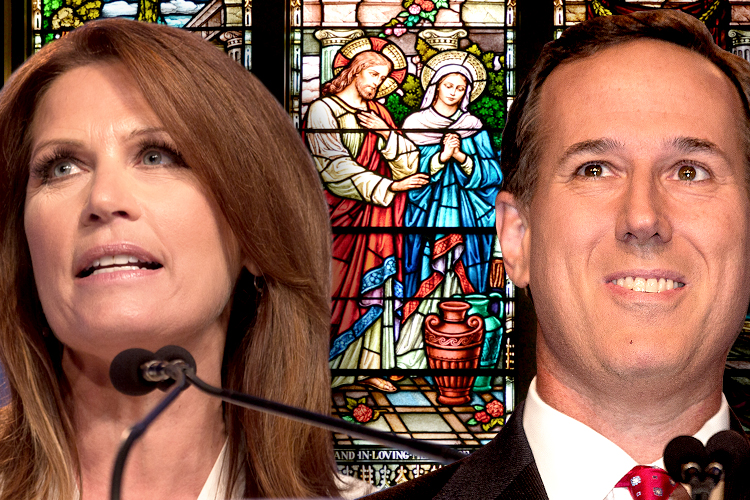I wrote a piece earlier about the GOP’s “three-legged stool” that stands for “family values, small government and strong national defense” in light of the recent resurgence of jingoistic fear-mongering in the 2014 campaign ads. The commentary on the right has been shifting perceptibly day by day as the threat of ISIS and our renewed military involvement in the Middle East tickled the martial lizard brain into action. But what of the other legs on the stool? The Christian Right is very likely to be on board with whatever military adventures the Republicans push (they usually are) but they are also likely to be agitated at the loss of prestige within the party and what they see as a defeatist attitude toward such issues a gay marriage and contraception.
The right wing firebrands’ reaction to the Supreme Court’s decision not to make a decision on marriage equality this week is instructive. The Tea Party king Ted Cruz wasted no time in condemning the Court saying, “by refusing to rule if the states can define marriage, the Supreme Court is abdicating its duty to uphold the Constitution.” (He went on to bizarrely call the Court’s failure to act “judicial activism at its worst.” Ok.)
Christian Right leader and possible presidential candidate Mike Huckabee said:
“It is shocking that many elected officials, attorneys and judges think that a court ruling is the ‘final word,'” Huckabee said. “It most certainly is not. The courts are one branch of government, and equal to the other two, but not superior to either and certainly not to both. Even if the other two branches agree with the ruling, the people’s representatives have to pass enabling legislation to authorize same sex marriage, and the President (or Governor in the case of the state) has to sign it. Otherwise, it remains the court’s opinion. It is NOT the ‘law of the land’ as is often heralded.”
(And then he stood on the courthouse steps and thundered, “In the name of the greatest people that have ever trod this earth, I draw the line in the dust and toss the gauntlet before the feet of tyranny, and I say No gay marriage now! No gay marriage tomorrow! No gay marriage forevuh!”)
In fairness, Huckabee has been out of government for some time now, kicking back, playing guitar on his Fox News gig with his buddy Ted Nugent so he’s probably forgotten how American government works. Still, he probably spoke for many members of the religious right in his anger that the Court didn’t take the opportunity to strike down the abomination of marriage equality, especially since they’d been led to believe that they finally achieved their goal of a conservative majority that would give them everything they want when they want it. Why if it weren’t for decisions allowing corporations “religious liberty” and banning buffer zones at abortion clinics, they wouldn’t have had anything to cheer about in 2014 at all.
Regardless of their relative wins at the Supreme Court and their successful nationwide campaign to make abortion impossible for millions of women, the last few years have left the social conservatives feeling a bit bereft. Their candidates have been marginalized for believing odd myths like the one which says a woman’s body “shuts down” and won’t allow pregnancy as a result of rape or making impolitic statements about the sexual habits of the 97% of women who use birth control. After the debacle of 2012, the GOP felt the need to rein them in and they are feeling a little bit unloved and unneeded as a result.
There is always a bit of tension between the Party and the social conservatives because there is a long tradition (and strong theological basis) for evangelical Christians to reject involvement with the secular world and retreat from civic participation. And one of their strengths comes from being able to leverage their flock in this way and keep the Republicans from ever taking them too much for granted. After all, the creation of the modern religious right through groups like the Moral Majority and the Christian Coalition back in the 1970s and 80s stemmed from the observation that there was a bloc of conservative non-voters who were already organized and easily activated. They could easily go back to their old ways.
But Ed Kilgore sees a new wrinkle in all this that’s bound to tie the GOP up in knots if it comes to pass:
[A]s the “religious liberty” movement continues to develop, you could see it morph into the theoretical foundation for a parallel society in which the painful diversity of contemporary life, and its disturbing clatter of demands for “equality” and “non-discrimination” and “rights” (other than religious rights and the Right To Life, of course) is simply excluded, along with “government schools” and secular news and entertainment.
Presumably the Republican Party could thrive as the exclusive political champion of this parallel society — the One Party for the One-Party-State of conservative conformity operating at the margins of the heathenish remainder of the country. There are sunbelt suburbs, in fact, where this is pretty much already a reality. But there’s danger in too much reliance on liberating conservatives from “judicial activism” via an ever-expanding zone of “religious liberty:” opponents of same-sex marriage and abortion/contraception could become complacent and lose the spiritual muscle-tone provided by fighting to restore godly norms for all Americans. There’s a long history of conservative evangelicals retreating into apolitical and interior lives; that’s where they largely existed for many decades prior to the 1970s.
Wouldn’t it be something if the Republican Party ended up kicking out one of the legs of its famous stool through the “judicial activism” of the most conservative Supreme Court in memory? It’s a distinct possibility. Stay tuned.

